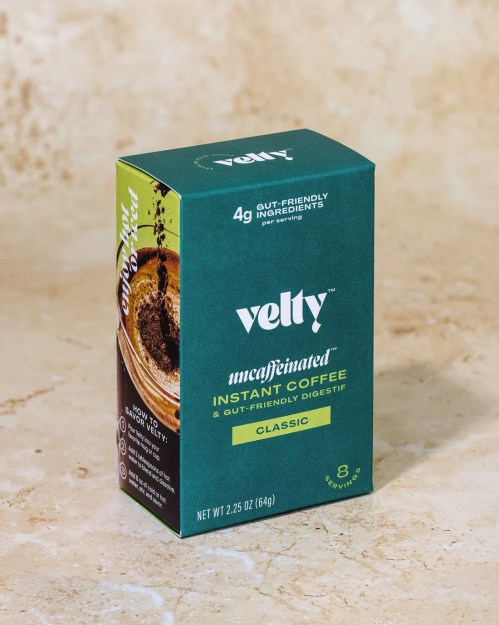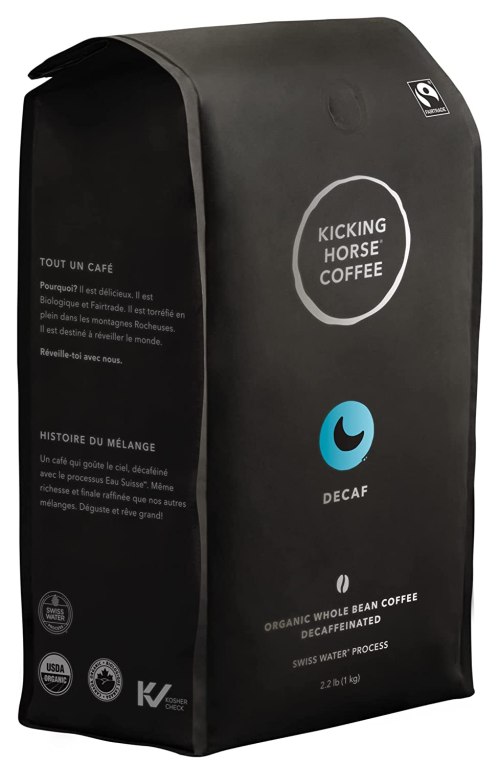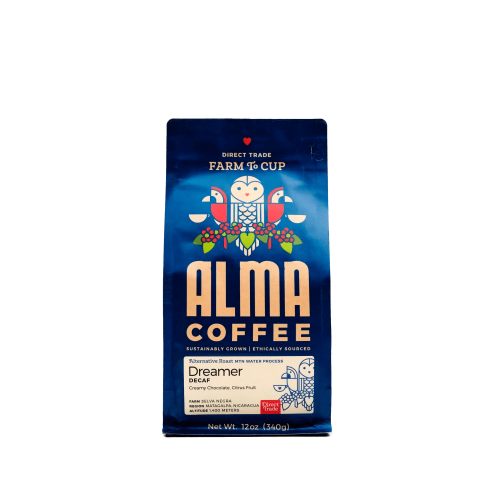Our editors independently select these products. Making a purchase through our links may earn Well+Good a commission
POV: It’s five in the afternoon, you’re craving coffee, but you’ve got that agonizing voice in the back of your head telling you that indulging in a cup this late in the day will unquestionably keep you up all night, tossing and turning, counting sheep to no avail.
Experts in This Article
founder and director of Real Nutrition
Yes, we all love the taste of coffee, but sometimes it can put us well over the edge with that jittery, antsy feeling that can quickly become unpleasant… especially late in the day. So, what can we sip on to curb our coffee cravings without the over-caffeinated repercussions? Enter decaf coffee—the decaffeinated fraternal twin of our regular coffee in the morning that tastes and looks almost the same.
Aside from the obvious, we know that decaf coffee won’t give you the same buzz as a regular cup of java (ICYDK, some decaf coffee still has some caffeine in it). But how exactly does this caffeine-free version stack up against our good ol’ favorite coffee, aka a gastroenterologist’s favorite drink to sip on for digestion and regularity? We spoke with a registered dietitian who explained the differences (and similarities) between decaf and regular coffee to see if it’s really worth brewing.
What are the benefits of consuming decaf coffee, according to a registered dietitian?
According to Amy Shapiro, MS, RD, CDN, a registered dietitian and the founder and director of Real Nutrition, decaf and regular coffee aren’t all that dissimilar. On the contrary, they contain almost all the same nutritional value and health benefits, including essential nutrients like potassium and magnesium and anti-inflammatory antioxidants. “Decaf coffee still contains the same antioxidants that regular coffee does, except they may be lower by about 15 percent, which is lost when going through the process to remove caffeine,” Shapiro says.
It’s just as good for the gut as regular coffee
Additionally, caffeinated or not, coffee can have a positive impact on gut health, according to healthcare professionals. “Both regular and decaffeinated coffee increases the activity of the colon, leading to more pressure waves,” Will Bulsiewicz, MD, a board-certified gastroenterologist and the author of Fiber Fueled, previously shared with Well+Good on why it’s excellent for promoting digestion. Shapiro also notes that some studies point to a correlation between decaf coffee consumption and a reduced risk of colorectal cancer. (Although keep in mind that you shouldn’t have coffee first thing in the morning.)
It’s linked to brain-boosting benefits
Shapiro says that decaf brews can have brain-boosting benefits, too. “Decaf coffee has been shown to protect neurons in the brain, possibly decreasing the occurrence of cognitive issues such as Parkinson’s and Alzheimer’s; this is possibly due to the chlorogenic acid, not the caffeine found in coffee as originally speculated,” she says.
It’s ideal for folks with caffeine sensitivities
Shapiro also shares that decaf coffee may decrease heartburn and acid reflux frequency and intensity. “Decaf coffee is not as irritating on the gut and colon, so you may not experience the urgency to use the bathroom after drinking it, much like regular coffee for some,” she says. As such, folks that tend to experience stomach issues after downing a cup of joe might have a sensitivity to the caffeine content. That can trigger a slew of GI-related symptoms, aside from the immediate urgency of having to go number two. This includes might include nausea, GERD symptoms, or the production of additional stomach acid. (Plus, you should probably also stay away from the olive oil coffee trend to minimize stomach-related issues.)
Why decaf coffee might not be right for you
Although decaf and regular coffee share many of the same characteristics and benefits, there is one glaring difference: the caffeine content (or lack thereof), which Shapiro says can come with a few drawbacks. “Without caffeine, decaf coffee doesn’t assist with benefits like improving mood, increasing metabolism, and improving athletic performance,” she explains.
In sum, like most things in life, it’s about balance and moderation and listening to your own body—which is why if you’ve seemingly had enough caffeine to fuel a small airplane engine (or you’re sensitive to the effects of caffeine), it might be time to call on a decaf version of our favorite brew (or some of the best low-acid coffees on the market.)
4 decaf coffees that taste just as good (or better) than the real thing
Best decaf coffee for acid reflux
1. Bean & Bean Single Origin Mexico Decaf
By now, you may know we love Bean & Bean’s coffees—and this decaf version definitely lives up to our coffee-loving expectations. It’s organic, fair trade, and has all of the coffee flavor we know and love, minus the caffeine. So, is there really no caffeine in decaf coffee beans? In short, yes. However, coffee (beans) must undergo a process to remove caffeine to become decaf.
In this case, Bean & Bean’s beans (ha!) hail from the Chiapas region in Mexico and undergo a mountain water process, which involves pre-soaking the coffee in water to expand the beans for caffeine extraction and then introducing a solution concentrated with coffee solubles that extract the caffeine without impacting the coffee’s particular flavor. The result is a delicious blend of flavor notes, including orange, milk chocolate, and brown sugar. YUM.
And, in case you were wondering, what decaf coffee is processed without chemicals? You’re looking right at it. According to the folks at Bean & Bean, this product undergoes a milling process known as “decaf mountain water processed,” meaning that no chemicals are used during the extraction. Instead, coffee beans are soaked in hot water, which extracts the caffeine without the use of chemicals. However, it’s important to note that this method may also remove other (oftentimes desirable) elements in coffee, such as acids, fats, and oils.

Bean & Bean Single Origin Mexico Decaf — $16.00
Best instant decaf coffee
2. Velty Uncaffeinated Instant Coffee
Velty is a woman-owned decaf coffee brand with benefits like prebiotics and antioxidants. This instant coffee comes in individually packaged sachets for ease and convenience, which can be used to make instant iced or hot coffee in seconds. And to further boost its gut-friendly benefits, Velty coffee is made with additional ingredients like fiber-rich inulin derived from Jerusalem artichokes, as well as reishi and lion’s mane mushrooms for cognitive health. Best of all, the coffee has smooth, sweet chocolate notes—and who doesn’t love chocolate and coffee together?

Velty Uncaffeinated Classic Coffee — $28.00
Best decaf espresso
3. Kicking Horse Decaf Coffee
With over 1,600 reviews on Amazon and four and a half stars, it’s safe to say Kicking Horse Coffee’sdecaf coffee is a crowd favorite. The coffee blend hails from Central and South America and has a nutty, deep chocolate aroma and tasting notes of roasted hazelnuts. It’s versatile and can be brewed whichever way you like including methods like French press, drip, pour-over, or espresso. And to make sure it’s as decaffeinated as possible, it undergoes the Swiss Water Process (SWP), a patented decaffeination method that uses only water to remove 99.9 percent of a coffee’s caffeine content.

Kicking Horse Decaf Coffee — $32.00
Best dark roast decaf coffee
4. Alma Dreamer Decaf
Calling all medium-to-dark roast coffee lovers: Alma Dreamer’s decaf coffee is for you. This product hails directly from family-owned coffee farms in Honduras, where the roasters pour (pun intended) their hearts and souls (or their alma, which is Spanish for soul) into each and every cup of coffee. It has a comforting and rich flavor profile with notes of brown sugar, nuts, and ripe fruit and is available for purchase on Trade Coffee, a coffee-delivery service.

Alma Dreamer Decaf Coffee — $23.00
An RD shares all the reasons we should love coffee:
Sign up for the Well+Good SHOP Newsletter
Get exclusive deals on wellness, beauty, fitness, and food products that have been hand-picked by our editors.
Got it, you've been added to our email list.











